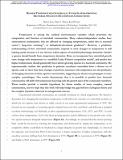| dc.contributor.author | Lax, Simon | |
| dc.contributor.author | Abreu, Clare Isabel | |
| dc.contributor.author | Gore, Jeff | |
| dc.date.accessioned | 2020-10-27T14:35:55Z | |
| dc.date.available | 2020-10-27T14:35:55Z | |
| dc.date.issued | 2020-03 | |
| dc.date.submitted | 2019-07 | |
| dc.identifier.issn | 2397-334X | |
| dc.identifier.uri | https://hdl.handle.net/1721.1/128214 | |
| dc.description.abstract | Temperature is one of the fundamental environmental variables that determine the composition and function of microbial communities. However, a predictive understanding of how microbial communities respond to changes in temperature is lacking, partly because it is not obvious which aspects of microbial physiology determine whether a species could benefit from a change in the temperature. Here we incorporate how microbial growth rates change with temperature into a modified Lotka–Volterra competition model and predict that higher temperatures should—in general—favour the slower-growing species in a bacterial community. We experimentally confirm this prediction in pairwise cocultures assembled from a diverse set of species and show that these changes to pairwise outcomes with temperature are also predictive of changing outcomes in three-species communities, suggesting that our theory may be applicable to more-complex assemblages. Our results demonstrate that it is possible to predict how bacterial communities will shift with temperature knowing only the growth rates of the community members. These results provide a testable hypothesis for future studies of more-complex natural communities and we hope that this work will help to bridge the gap between ecological theory and the complex dynamics observed in metagenomic surveys. | en_US |
| dc.language.iso | en | |
| dc.publisher | Springer Science and Business Media LLC | en_US |
| dc.relation.isversionof | http://dx.doi.org/10.1038/S41559-020-1126-5 | en_US |
| dc.rights | Article is made available in accordance with the publisher's policy and may be subject to US copyright law. Please refer to the publisher's site for terms of use. | en_US |
| dc.source | bioRxiv | en_US |
| dc.title | Higher temperatures generically favour slower-growing bacterial species in multispecies communities | en_US |
| dc.type | Article | en_US |
| dc.identifier.citation | Lax, Simon et al. "Higher temperatures generically favour slower-growing bacterial species in multispecies communities." Nature Ecology and Evolution 4, 4 (March 2020): 560–567 © 2020 The Author(s) | en_US |
| dc.contributor.department | Massachusetts Institute of Technology. Department of Physics | en_US |
| dc.relation.journal | Nature Ecology and Evolution | en_US |
| dc.eprint.version | Original manuscript | en_US |
| dc.type.uri | http://purl.org/eprint/type/JournalArticle | en_US |
| eprint.status | http://purl.org/eprint/status/NonPeerReviewed | en_US |
| dc.date.updated | 2020-10-26T16:28:40Z | |
| dspace.orderedauthors | Lax, S; Abreu, CI; Gore, J | en_US |
| dspace.date.submission | 2020-10-26T16:28:47Z | |
| mit.journal.volume | 4 | en_US |
| mit.journal.issue | 4 | en_US |
| mit.license | PUBLISHER_POLICY | |
| mit.metadata.status | Complete | |
